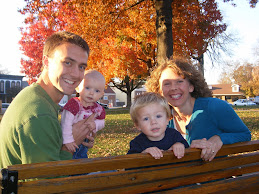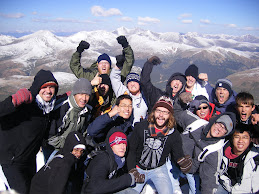Hello Everyone,
One of the luxuries afforded me by this job (and one of the critical disciplines for my success in this job!) is the freedom to withdraw from the "frontline" ministry of the campus and consider our work from a larger perspective. So often, our lives can become consumed with just "keeping the ship afloat": running our programs, recruiting for events, and doing the ins and outs of campus ministry, but the danger is that we lose the heart of why we are doing all this activity in the first place. I've been so thankful as of late for the clarity that I think God is bringing to my mind about both what we do and why we do it.
There's significant thinking going on in InterVarsity circles these days about conversion. For me, most of my staff, and likely many of you as well, we've understood conversion in very black and white, two-stage language: first, you are a non-Christian, and then you become a Christian when you pray the following prayer.
This way of thinking certainly has some merit, and is to an extent an accurate representation of what happens in conversion: we are transferred from the kingdom of the world into the Kingdom of God; we who were dead are made alive; we were in darkness but find ourselves in light.
The problem is that for many of us (and increasing numbers of students), their experience of their life with God doesn't feel quite this simple. As we train and inspire our current students to reach their friends with the good news of God, we have to acknowledge that under the heading of "non-Christian" there is an entire array of people: some are skeptical, some are indifferent, some are hostile, some are merely "enculturated" into Christianity. While the absence of a vibrant relationship with Jesus unites all these folks, to apply a "one size fits all" approach to witness with each of these subgroups would be painfully ineffective.
The other problem is that the language of "two-stage" conversion has no place for the ongoing discipleship of those of us who have chosen to follow Jesus; it can lend itself to the thought that, "well, I'm a Christian now, so my journey is complete" when we all know that choosing to follow Jesus for the first time is far more an inauguration than it is a destination.
As I reflect on my own life, I have a hard time pointing to "the moment" when I became a Christian. I remember praying for the first time on my parents' bed when I was about 6, but I didn't experience a radical life altering encounter with Jesus then. What I did experience was a steady progression of growing in love for God, and appropriating that love in my own life.
But something distinctly different happened to me in college. I didn't "become a Christian" again, but I began to experience a level of vibrancy and passion for God that I hadn't known before, and in retrospect, I think what happened was a "second conversion": I was transformed from being merely a follower to being a missionary sent by God to my campus. In many ways, this "missional" conversion has altered the entire trajectory of my life in a way that nothing else has (I'm not exactly designing golf courses, as was the original plan!)
As I've prayed and reflected on our work on campus, I'm seeing more and more that the driving motivation behind all of our labor is simply this: we labor to see students' lives transformed. But even more specifically than this, I think God is giving me greater clarity on two critical transformations that we witness God working in our students.
The first is the conversion from being merely "enculturated" into faith to actively, passionately following Jesus. In our midwestern context, students with no church experience or little awareness of Christianity is actually quite rare. Almost every freshman who steps onto the campuses where we work has either "done the church thing" growing up, or may even consider themselves a "christian" in a vague, cultural sense: their allegiance is to a cultural expectation, not to a living God. Our work and our passion is to see these folks "woken up" from their inoculation to the life of faith, by creating spaces where they can encounter a living, active Jesus, and by consistently calling them to make him Lord of their real lives. Not "Lord" in a prayer alone, but "Lord of what they watch, how they speak, and how they love their neighbors. Each year, dozens of students experience this transformation in our midst; it makes me smile just thinking about them.
The second is the conversion from merely "following" Jesus to being engaged in his purposes: a "missional" conversion. The vast majority of genuinely Christian students who show up on our campuses have a view of faith that centers on "their personal relationship with Jesus": worship serves to edify them, they want to "be fed" by good teaching, they are looking for Christian community to help them grow. All these things are good and important, but I would argue that they are missing the lifeblood of Jesus: "Go into the world and make disciples of all nations..." I believe this transformation from living a nice, personal, spiritual life, to living a life of radical mission, sacrifice, hospitality, and invitation is absolutely central to what we do on campus. Our goal is not to help people become better Christians; our goal is to release the next generation of leaders and missionaries who will sow themselves like mustard seeds into every corner of the globe that God's Kingdom may come.
This is why we exist: to see students converted from skeptical, selfish, indifferent lives to vibrant relationship with Jesus and then in turn transformed into followers who spend their entire lives for the sake of God's mission to a broken world.
May God grant us the desires of our hearts!
Jon
Wednesday, November 12, 2008
Subscribe to:
Comments (Atom)






















+057.jpg)
+100.jpg)
+095.jpg)










